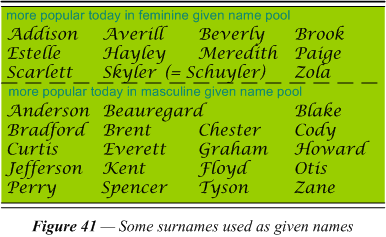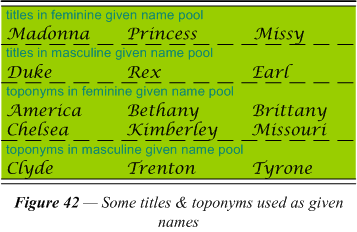
3.2 Role change. It is quite common in English for given names to be derived from a surname. This happens for names of both girls and boys, but about four or five times more often for those of boys. Many of these, such as, Leslie, Sidney, Taylor may predominate as masculine or feminine in different times and places. Figure 41 lists some of the more common such names that tend strongly to be distinguished by gender

In English most of the adaptation of titles, toponyms, locales, occupations and patronymics into surnames occurred in Middle English, near the end of the Middle Ages. Some of these are discussed further in their own sections. It seems that some given names continue to be adapted from titles and toponyms even in the modern period. A few examples are listed on figure 42. It is probable that some of these were influenced by or intentionally adapted from the corresponding surnames.

In some cultures the names of gods are taboo with regard to the use of their names in the personal name pools. This is not the case in India. When borrowing is involved, this taboo may be lifted, so that there are some names in English that come from the names of gods in other cultures, e.g., Diana, Apollo.
The affixes may indicate a patronymic e.g., –son, –dotter in Swedish. In this way the family name is adapted from the father’s given name, so that Hansson or Hansdotter indicates that the person is the child of Hans. It is therefore possible to predict for each masculine given name through a rule of derivation that there is a patronymic (surname) based on it. In some cultures (a few survive in Middle English) had a system of metronymics where the feminine given names participate in these rules of derivation. In Celtic (Irish and Scottish) the patronymic is formed by the use of a prefix, O’–, Mac–, Mc–, M’–. There is no gender distinction for these prefixes, though sometimes they are written as particles. The patronymic particle in Welsh is written as a separate word, but agrees in gender with the child’s given name. Thus there is ab (m.) before words beginning with a vowel, ap (m.) before words beginning with a consonant, and verch (f.) for the more modern spelling merch.
